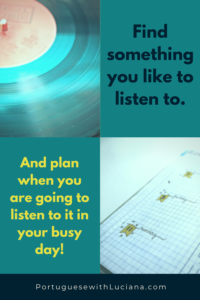
How to keep up with your Portuguese if you are too busy for regular lessons?
I started thinking about this article because of a very organized student whose life has changed a lot and couldn’t study as she used to.
Of course, I’ve had busy students before and had given tips and tried to find ways students could keep up with Portuguese even when they were super busy to study.
I also want to thank all my students who have been sharing their favorite blogs, social media accounts, YouTube channels, etc, they’ve been using to learn Portuguese. I’ll use them in this blog post, too! 🙂
If you are too busy to study Portuguese…
 So you speak Portuguese, maybe you even studied it for some years, you reached a good level, but suddenly life got in the way and you had to stop studying or practicing. What do you do?
So you speak Portuguese, maybe you even studied it for some years, you reached a good level, but suddenly life got in the way and you had to stop studying or practicing. What do you do?
- Forget all about Portuguese and if you have a good memory, you’ll still remember it in the future.
- Try to find a way to add Portuguese to your routine.
If you chose number 2, this blog post will help you with material and ideas of what to do to maintain your Portuguese. Your homework here will be to find some time to read this post, choose the best ideas for you, and think about moments of your day or week when you can use to do something in Portuguese. And change habits a little, so Portuguese will have more space in your life.
I also encourage you to analyze your routine, adapt some ideas for you, and be creative to come up with your ways to add Portuguese to your busy life. And leave a comment with your favorite ideas below!
A quick note for total beginners: I think it’s harder for you, I’m sorry. If you want to start learning Portuguese from scratch but have no time for it right now, you can listen to some music or read about it in your native language. This way you start having contact with Portuguese and when you find time to be consistent, you start learning it.
The first thing that comes to our minds when we talk about maintaining a language is by listening. It’s obvious, isn’t it? If you don’t have time, you can listen to something while doing other tasks. In this blog post, I want to cover all four skills.
Also, keep in mind that the goal of this post is not to help you improve or advance in all areas, but give you ways to not forget what you have already learned in Portuguese when you don’t have time to study.
I’ve separated this article in sections below so you can go directly to the ones that are most important for you:
Listening
What can you listen to: podcasts, music, TED talks, audiobooks.
You can start with music for times of the day when you can’t pay much attention and use podcasts, TED talks, or audiobooks when you can pay more attention.
I’d also prefer listening to shorter material and just listen to audiobooks at an advanced level of Portuguese.
 Find something you like to listen to. I’d never listened to a celebrity gossip podcast because I have no interest in it. But if you love it and want to know what’s going on in the celebrity world, this is the subject for you!
Find something you like to listen to. I’d never listened to a celebrity gossip podcast because I have no interest in it. But if you love it and want to know what’s going on in the celebrity world, this is the subject for you!
Also, if you need to learn something new or you are curious to learn the vocabulary related to your job or hobby, for example, look for this kind of content.
The content has to be interesting and relevant for you because you won’t listen to it just once!
Example situation: you listened to a podcast when you went to work, listen to it again when you go back home. See if you understand better the second time and if you remembered some words. I’ve already talked about the importance of repetition in this blog post and also in this one.
If it’s possible for you, write new words on Keep or Evernote (or any note-taking app). Or even better, write some sentences about what you listened to. Do it in your commute or if you are waiting somewhere. The key is to find spare minutes in your day. If you pay attention, I’m sure you’ll find!
Choose the correct level! If you are advanced and want to listen to content created to native speakers, it’s perfect. But if you are a beginner or intermediate, you’ll feel overwhelmed or disappointed. So look for material for your level or a bit above your level (if it’s too easy, it’s also not good – I know you are busy, but you still need a challenge! ;))
Plan, plan, plan! If you know you’ll have to walk your dog for 20 minutes before going to work, have your podcast ready to listen in your phone for when you leave home.
Suggestions:
Music, podcasts, audiobooks, etc are personal, so if you are going to use them to study, it’s better you like the material! Here you have a few suggestions:
- All songs in this playlist have an activity on Didaski. And this playlist was made by Arnaldo Antunes!
- A Brazilian radio station, only MPB (Música Popular Brasileira).
- BrazilPod, a podcast for students of different levels.
- Podcast with short stories for kids. Clear pronunciation for beginners.
- Fala Gringo is a podcast for intermediate students.
- I’ve created this playlist of TEDx Talks in Portuguese.
- If you like Audible, here you can find some audiobooks in Portuguese. They are paid, but the first 2 are free. 🙂
- And also this playlist of audiobooks on YouTube.
Which one is your favorite?
Reading
 What can you read: news, books, short stories, blogs, social media posts
What can you read: news, books, short stories, blogs, social media posts
If you like reading news, you can download a newsreader app (when I started thinking about this post I tested 2 apps: Brasil Notícias and Brazilian Newspapers – I preferred Brasil Notícias.)
In Brasil Notícias you can choose up to 30 news sources and if you don’t know any, you can look for more info about them before reading so you’ll learn about their tendencies or political views.
I’d prefer reading books, short stories or blogs related to things I like rather than reading the news. But it also depends on what you like, your needs, and your time. So first, think about subjects you want to know about and what you want to read in Portuguese. If you are learning Portuguese because it’s your dream to visit São Paulo, go to Instagram and start looking for accounts related to the city.
If reading is a relaxing activity for you, you can try books or short stories in Portuguese. But it’s the same as above: you have to find the right reading for your level, plan in advance, and think when you can add reading to your busy life.
Also, in many reading apps, it’s possible to highlight words to create flashcards with them. By the way, studying with flashcards is another activity you can try to add to your routine.
If you turn your phone, computer, tablet, frequently used sites, etc to Portuguese, you’ll be reading the language anyway.
Question for you: what do you read in your day? What can you read in Portuguese?
Writing
As I said here, writing is my favorite activity when learning a language!
If you are too busy, of course, you won’t write essays to practice for Celpe-Bras. But there are many other things you can write, like:
- Shopping lists or to-do lists (it may be harder than you think!).
- List of books you want to read or movies you want to watch – I know, many of them will have English names :/
- List of new words.
- Write to your Brazilian friends or in-laws (if that’s your case).
- Find or create your own WhatsApp (or Telegram, or Line, etc) group to write in Portuguese.
- Join Facebook groups to read, write, and help other people (if it’s possible for you).
- Take notes of what you heard or read.
- Copy your favorite quotes from books.
- Make a list of memories or funny things that happened to you.
- Write a diary/journal – here you have some ideas of what to write in yours:
- Thoughts and brilliant ideas.
- Description of people you met.
- Description of things you see, your house, car, city, living room, anything!
- Your feelings and emotions.
- Daily events.
Grab a post-it and write a note for you: Escrever em português!
Speaking
This one may be the hardest skill to practice when you don’t have time for lessons (and don’t live in a Portuguese speaking country).
Depending on where you live, you can try to find meetups to practice Portuguese. I know you are busy, but even busy people need to unwind sometimes!
 If you are in WhatsApp groups, try sending some voice messages. In Brazil, we use voice messages a lot, but once I read it’s not so popular abroad. Maybe you can send voice messages to yourself with reminders or to-do lists?
If you are in WhatsApp groups, try sending some voice messages. In Brazil, we use voice messages a lot, but once I read it’s not so popular abroad. Maybe you can send voice messages to yourself with reminders or to-do lists?
Or try to book online lessons, see if you can fit them in your routine once in a while.
When you read, you can read some passages aloud. You can also sing or speak in Portuguese in the shower!
And now, read aloud: falo português sozinho/a todos os dias e estou muito feliz por praticar!
Fun
There are some Brazilian artists that I’d love to see here in Portugal, where I live. But I’m in a small town, 1 hour from Lisbon. If I would just wait to receive news I’d never know Tribalistas played in Lisbon in 2018. So I created Google Alerts for artists I’d like to see.
Look for Brazilian restaurants or shops near you. Many students already told me they ordered food in Portuguese in Brazilian restaurants in their city around the world!
Also, check local apps, or Facebook groups for meetups or language events. In Athens, I used to go to a Spanish meetup and they had a Facebook page and group.
I really hope this blog post inspired you to analyze your busy routine and try to add a bit of Portuguese in it – it’s sad to lose what you already know!
Also, if you have other ideas, leave them in the comment section below – you’ll help another busy person like you!



